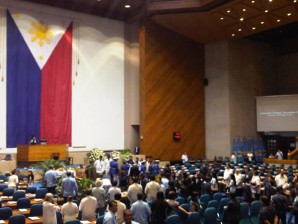
House of Representative. INQUIRER.net FILE PHOTO
MANILA, Philippines — The Kasambahay Bill inched closer to enactment into law Tuesday after the congressional bicameral conference committee reconciled contentious issues on the proposed measure.
Aurora Representative Juan Edgardo Angara told reporters that conferees from both chambers of Congress met until roughly 1 a.m. and finally agreed on setting the monthly minimum wage of domestic workers to P2,500 within the National Capital Region, P2,000 for those within chartered cities and first class municipalities, and P1,500 for those in other municipalities.
Northern Samar Representative Emil Ong, chairman of the House committee on labor and employment, along with Angara, Cagayan Province Representative Juan Ponce Enrile Jr., Cagayan de Oro Representative Rufus Rodriguez, Akbayan Partylist Representative Walden Bello, Valenzuela Representative Magtanggol Gunigundo, Iloilo Representative Janette Garin, Albay Representative Edcel Lagman and Zambales Representative Mitos Magsaysay met with Senators Jinggoy Estrada, chairman of the Senate committee on labor and employment, Loren Legarda, Pia Cayetano, Bong Revilla Jr., and Lito Lapid.
“Finally at our third try, we reached an agreement [on the minimum wage]…, Angara said.
He said senators initially sought fixed salaries while congressmen wanted to give the wage boards the power to set minimum wage and adjust it every year.
He said that they agreed on the minimum wage rates after considering worries about inflation if they increase the pay too much.
A year after implementation, Angara said that the Regional Tripartite Wages and Productivity Boards will be mandated to look into the minimum wage rates.
All labor disputes will be raised to the regional offices of the Department of Labor and Employment while ordinary crimes and offenses will be handled by the regular courts.
Household help will also enjoy social benefits as members of the Social Security System, PhilHealth, and Pag-Ibig Fund. Angara said that these benefits will be shouldered by employers of domestic helpers earning below P5,000.
Should the employee’s salary be more than P5000, under the proposed measure, the payment of contributions for SSS and Pag-Ibig Fund will be shared by the employer and the helper. PhilHealth contributions will still be shouldered in full by the employer, he said.
The reconciled measure also provides domestic helpers with at least a year of service an annual incentive leave of five days with pay. They will also be entitled to receive 13th-month pay.
Employers will also be prevented from hiring helpers below 15 years of age and placing them under debt bondage, according to the bill.
Angara, who chairs the House committee on higher and technical education, said that employers will also have to “adjust the work schedule of the domestic worker to allow access to education or training without hampering the services required by the employer.”
This was in line with their move to allow household helpers to finish basic education and gain access to higher education.
Angara said that they were hopeful that the Kasambahay Bill would be ratified within the week or early next week so it can be sent to Malacañang for President Benigno Aquino III’s approval.
At the Senate, Senator Jinggoy Estrada confirmed the fixed minimum monthly wage for domestic workers.
“The last time the minimum wage for household helpers was augmented was 19 years ago through Republic Act 7655 as approved last 1993,” Estrada said in the statement.
“The amounts stated in our Labor Code are very much outdated and unrealistic, considering the high cost of living especially in the metropolis. I think it is high time to increase the minimum wage which can be considered decent compensation,” he said.
“We are also not preventing well-off employers from paying much higher wages to their household helpers,” Estrada said.